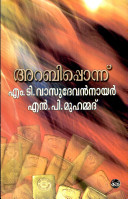
Malayalam, the lingua franca of the Indian state of Kerala and the union territories of Lakshadweep and Puduchery, is one of the six classical languages of India. Malayalam literature comprises those literary texts written in Malayalam, a South-Dravidian language spoken in the Indian state of Kerala. The first travelogue in any Indian language is the Malayalam Varthamanappusthakam, written by Paremmakkal Thoma Kathanar in 1785. Malayalam literature has been presented with 6 Jnanapith awards, the second-most for any Dravidian language and the third-highest for any Indian language.
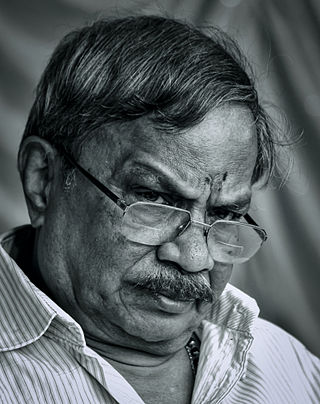
Madath Thekkepaattu Vasudevan Nair, popularly known as M.T., is an Indian author, screenplay writer and film director. He is a prolific and versatile writer in modern Malayalam literature, and is one of the masters of post-Independence Indian literature. At the age of 20, as a chemistry undergraduate, he won the prize for the best short story in Malayalam at World Short Story Competition conducted by The New York Herald Tribune. His first major novel Naalukettu, written at the age of 23, won the Kerala Sahitya Akademi Award in 1958. His other novels include Manju (Mist), Kaalam (Time), Asuravithu and Randamoozham. The deep emotional experiences of his early days have gone into the making of MT's novels. Most of his works are oriented towards the basic Malayalam family structure and culture and many of them were path-breaking in the history of Malayalam literature. His three seminal novels on life in the matriarchal family in Kerala are Naalukettu, Asuravithu, and Kaalam. Randamoozham, which retells the story of the Mahabharatha from the point of view of Bhimasena, is widely credited as his masterpiece.

The University of Calicut, also known as Calicut University, is a state-run public university headquartered at Tenhipalam in Malappuram district of the state of Kerala, India. Established in 1968, it is the first university to be set up in northern Kerala. The university is coordinated by the University Grants Commission.

Hariharan is an Indian film director who has directed over 50 Malayalam films. His movies mainly revolve around the cultural and relational aspects of a typical Keralite society. His most notable works include Sharapancharam (1979), Panchagni (1986), Idavazhiyile Poocha Mindappoocha (1979), Amrutham Gamaya (1987), Oru Vadakkan Veeragatha (1989), Sargam (1992), Parinayam (1994) and Pazhassi Raja (2009) which has won him wide critical acclaim. In 2019, he was awarded the J. C. Daniel Award, Kerala government's highest honour for contributions to Malayalam cinema.

Parutholli Chalappurathu Kuttikrishnan, popularly known by his pen name Uroob was an Indian writer of Malayalam literature. Along with Basheer, Thakazhi, Kesavadev, and Pottekkatt, Uroob was counted among the progressive writers in Malayalam during the twentieth century. He was known for his novels such as Sundarikalum Sundaranmarum and Ummachu, short stories like Rachiyamma and the screenplays of a number of Malayalam films including Neelakuyil, the first Malayalam feature film to receive the National Film Award. He was a recipient of several honours including Kendra Sahithya Academy Award and the inaugural Kerala Sahitya Akademi Award for Novel.

Karuvattu Mana Vasudevan Namboothiri, better known as Artist Namboothiri or simply Namboothiri, was an Indian painter and sculptor, known for his line art and copper relief works. He illustrated for many Malayalam writers such as Thakazhy Shivasankara Pillai, Kesavadev, M. T. Vasudevan Nair, Uroob, S. K. Pottekkatt, Edasseri Govindan Nair, and V.K.N., and was one of the most prolific literary illustrators of India. He was also a chairman of the Kerala Lalithakala Akademi. The Akademi awarded him the Raja Ravi Varma Award in 2003. He was also a recipient of the Kerala State Film Award for Best Art Director.
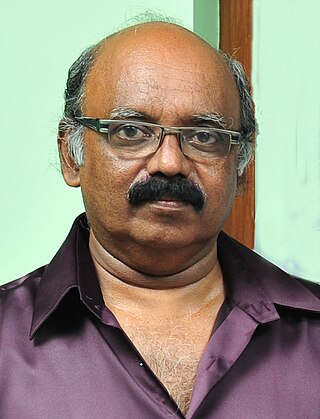
K. Ramachandra Babu was an Indian cinematographer of over 125 films, out of which most are Malayalam films. He also worked for films in Tamil, Telugu, Hindi, Arabic and English languages. He served as the cinematographer for several documentaries and advertisement films as well. He was the founder of the Indian Society of Cinematographers (ISC).
P. Kunjanandan Nair, better known by his pseudonym, Thikkodiyan, was an Indian playwright, novelist, lyricist and screenwriter of Malayalam. He was known for his contributions to the genre of radio plays and his autobiography, Arangu Kaanatha Nadan, which detailed the socio-cultural development of Malabar in the post-independent period, fetched him a number of awards including the Kendra Sahithya Academy Award, Kerala Sahitya Akademi Award for Biography and Autobiography, Vayalar Award and the Odakkuzhal Award.
N. P. Mohammed, popularly known by his initials N. P., was an Indian novelist, short story writer and screenwriter of Malayalam language. Along with his contemporaries like M. T. Vasudevan Nair, O. V. Vijayan, Kakkanadan, and Madhavikutty, he was known to have been one of the pioneers of modernist movement in Malayalam fiction. He was the president of Kerala Sahitya Akademi and a recipient of several awards including Kendra Sahitya Akademi Award, Kerala Sahitya Akademi Award for Story, Kerala Sahitya Akademi Award for Novel, Lalithambika Antharjanam Award, Padmaprabha Literary Award and the Muttathu Varkey Award.
Pattathuvila Karunakaran (1925–1987) was an Indian film producer and short story writer of Malayalam literature. He was best known for his book, Vimarsham and for his association with the film, Uttarayanam, the directorial debut of noted filmmaker, G. Aravindan, as the film's producer and story writer. Kerala Sahitya Akademi awarded him their annual award for story in 1972.
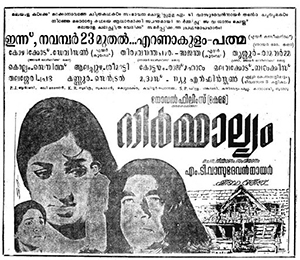
Nirmalyam is a 1973 Indian Malayalam-language film written and directed by M. T. Vasudevan Nair, and stars P. J. Antony, Sumithra, and Ravi Menon. P. J. Antony won the National Film Award for Best Actor in 1974 for his performance as a velichappadu in this movie. The film received the National Film Award for Best Feature Film and Kerala State Film Award for Best Film in 1974. It is one of the classics in Malayalam cinema. The film was based on M. T. Vasudevan Nair's short story Pallivaalum Kaalchilambum.

Panchagni is a 1986 Indian Malayalam-language crime drama film directed by Hariharan and written by M. T. Vasudevan Nair. The story is loosely inspired from the life of naxalite K. Ajitha who was part of the Naxalite movement in Kerala in the 1960s. The film tells the story of Indira, a Naxalite who comes out from prison on parole, while she serves a life sentence for killing a landlord. It stars Mohanlal, Geetha, Nadia Moidu, and Thilakan. It features songs composed by Bombay Ravi and a score by Pukazhenthi. The cinematography was done by Shaji N. Karun. Geetha's performance was considered noteworthy, and it established a bright career for her in the Malayalam film industry. She was even nominated for the National Award category for Best Actress.
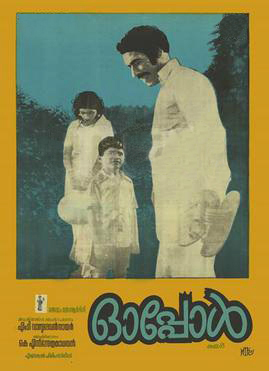
Oppol is a 1981 Malayalam-language drama film, produced by Rosamma George under the banner of JMJ Arts, directed by K. S. Sethumadhavan and written by M. T. Vasudevan Nair. The film stars Balan K. Nair, Menaka and Master Aravind in the lead roles. The film features original songs composed by M. B. Sreenivasan. The film was based on a short story of the same name written by M. T. Vasudevan Nair in 1975. The film revolves around Malu and her brother Appu. Malu marries Govindan and shifts to his house along with her brother. Appu however, becomes jealous of Govindan because he suspects that he will isolate him from his sister. The rest of the film deals with how they mend their relationship.
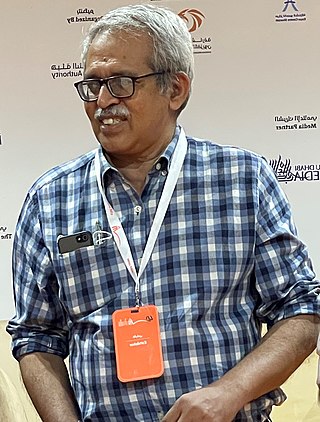
N. P. Hafiz Mohamad is an Indian author, sociologist, social activist, and political commentator, living in Kerala.

Ezhamathe Varavu is a 2013 Malayalam drama thriller film written by M. T. Vasudevan Nair and directed by Hariharan. The film stars Indrajith, Vineeth, Bhavana, and Kavitha in the lead roles while Mamukkoya and Nandhu play pivotal supporting roles. The music was composed by the director himself who also produced the film under the banner of Gayatri Cinema Enterprises.
Manju (Mist) is a novel by M. T. Vasudevan Nair published in 1964. With few conversations and minimal characters, it narrates the story of a school teacher. The novel is set in the mountains and valleys of Nainital where Vimala Devi, a teacher in a boarding school, waits in hope for the winter of her discontent to vanish. Despite having a family comprising a father, mother, sister, and brother, Vimala is kept aloof from them. She hates the company of her family and enjoys solitude. The eco-feminist theme of patriarchal domination and exploitation gains more prominence in Manju, MT's only novel with a female protagonist. The novel stands apart as it is set in a milieu different from the usual one, the Valluvanadan village.

Dr.Pramod Payyannur is an Indian Theatre and Film director and writer who works in Malayalam theater and Film industry. Dr.Pramod Payyanur is a leading figure in contemporary Malayalam Theatre. He made an indelible mark in experimental drama by presenting M.T. Vasudevan Nair's 'Iruttinte Aathmavu' in a sandwich stage during his college days at the school of Drama. He did his bachelor's degree in Malayalam literature from Payyanur College. He completed his bachelor's degree in Direction with first rank from School of Drama and Master's in Professional Arts from Pondicherry Central University. He also pursued PhD in the topic 'Tagore Triology in Global Theatre' in Santiniketan, Calcutta. He has proven his genius in both investigative and professional theatre. The innovative adaptation of famous literary works on the stage in what makes this theatre director unique. He has staged the works of M.T. Vasudevan Nair, Vaikkom Mohammed Basheer, O.V.Vijayan, Padmarajan, Dr. Sivarama Karanth, J.M. Synge, Albert Camus, Anton Chekhov and William Shakespeare. Pramod Payyanur's film directorial debut 'Balyakaalasakhi', an excellent adaptation of Basheer's work of the same name, won him wide acclaim. Mammootty was the protagonist of the movie and it was screened in various film festivals and won several accolades. He has also staged Basheer's 'Mathilukal' in which KPAC Lalitha and M.R. Gopakumar played the lead roles. He has edited the play 'Mrithyunjayan' which was a dream project of Bharat Murali. He has also adapted Edassery's 'Koottukrishi' onto the stage for Kerala Sangeetha Nataka Academy's first repertory theatre venture. When M.T's 'Randamoozham' was staged as a multimedia production with Pramod Payyanur as its Director, Mammootty played the role of Bheeman. Many alumni of the School of Drama and Kalamandalam also enacted in the play. A multimedia presentation 'Nanmayude Apaara Theeram' based on the themes of love and empathy as exemplified in Basheerian works, a visual treat which marked the major historical events from Kerala Renaissance to the modern age, 'Pravasa Malayalam' which visualized Malayali's early migration to new age migration, 'Mathrukam' which presented and honoured the achievements of Malayali women were various multimedia visual presentations supervised and realized by Pramod Payyanur for the various departments of the Government of Kerala. His new project aims to adapt Shakespearian drama 'Hamlet' into 'Chavittunatakam' with the help of 100 artists. He serves as the Member Secretary, Bharat Bhavan,The official Cultural Exchange Center of Government of Kerala since 2016. “Theatrum Farme”-a programme which combines culture, art and agriculture for the upliftment of differently abled students, jail inmates and tribal communities got a special mention by the Kerala Agricultural University. He got into the Guinness world records for the dialogue and screenplay of the movie 'Viswaguru' which was taken as a part of the 'Script to screen', a project based on the ideologies of Sree Narayana Guru. He has also won many accolades for his contributions to Malayalam theatre which include the staging of the plays written by K.T. Mohemmed, Dr. Vayala vasudevan Pillai and Safdar Hashmi. Pramod Payyanur is well aware of the fact that the art and cultural activities of the new age should be carried out with the participation of the masses. 'Nehru Yuva Kendra' and Prem Nazir Suhruth Samithi is really proud to dedicate the first Socio-Cultural Youth Icon award, a recognition for the young talent who actively engages in and enlightens the democratic and cultural sphere of Kerala, to Mr. Pramod Payyanur. He has directed the film Balayakala Sakhi based on Vaikom Mohammad Basheer's novel Balyakalasakhi, which acted by Mammootty, Isha Talwar,Seema Biswas, Meena, KPAC Lalitha and Mamukkoya. Pramod was the writer of Vishwaguru, the film was recorded in Guinness World Records as the fastest film produced. The film was scripted, created, and released in 51 hours and two minutes. He is currently working as the Member Secretary of Bharat Bhavan Kerala, an official cultural exchange centre for Kerala Government, Thiruvananthapuram, Kerala.
Kerala Literature Festival (KLF), founded in 2016, is an annual literary festival held on the beaches of Kozhikode, Kerala, India. The Festival on the beach is a non-aligned platform, committed to providing an open and liberal forums for debates and discussion to foster progressive discourses. The seventh and the latest edition of KLF was held from January 11–15, 2024. Kerala Literature Festival is organized by the DC Kizhakemuri Foundation, a philanthropic organization founded in 2001 as a tribute to late D.C. Kizhakemuri a freedom fighter, social activist, writer - publisher considered as the doyen of Indian publishing, and known as the father of paperback revolution in India, who took books to the masses. He was instrumental in the abolishment of sales tax on books. Kerala Literature Festival (KLF) is endorsed and supported by the Government of Kerala, Kerala Tourism and Culture Department. Renowned poet – critic Prof. K. Satchidanandan is the Festival Director along with Publisher Ravi Deecee of DC Books is the Chief Facilitator. The editorial team of DC Books works closely with KLF on the content.

South Malabar refers to a geographical area of the southwestern coast of India covering some parts of the present-day Kerala state. South Malabar covers the regions included in present-day Kozhikode taluk of Kozhikode district, the whole area of Malappuram district, Chavakkad taluk of Thrissur district, and Palakkad district, excluding parts of Chittur taluk. The Fort Kochi region of Kochi city also historically belongs to South Malabar. The term South Malabar refers to the region of the erstwhile Malabar District south to the river Korapuzha, and bears a high cultural similarity to both the Cochin and the North Malabar regions.
S. V. Venugopan Nair was an Indian writer, who wrote in Malayalam. He has won many awards including the Kerala Sahitya Akademi Award for Drama and Kerala Sahitya Akademi Award for Story.
